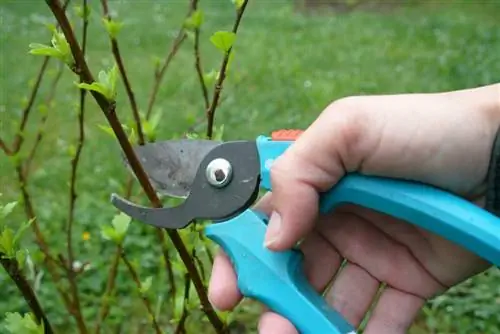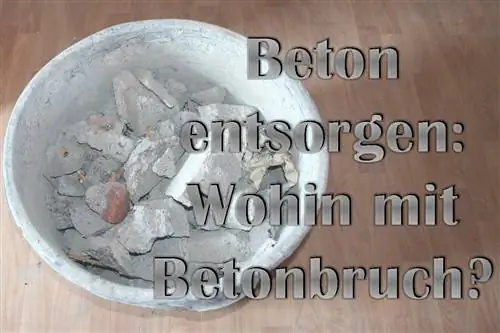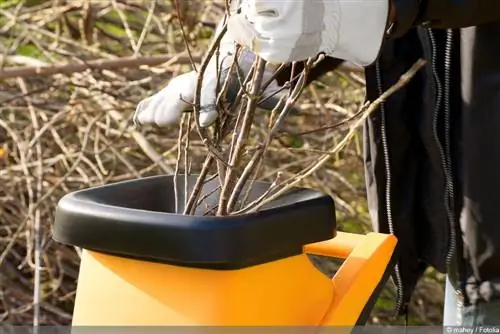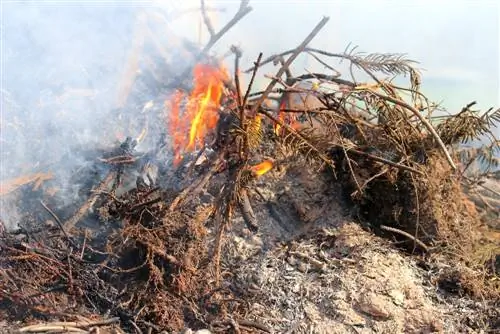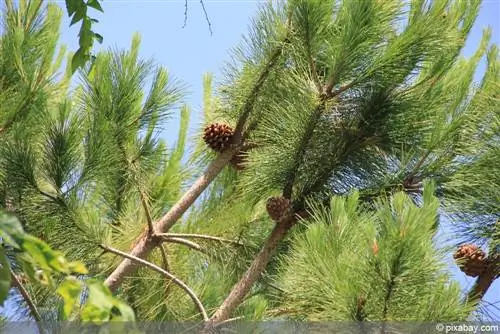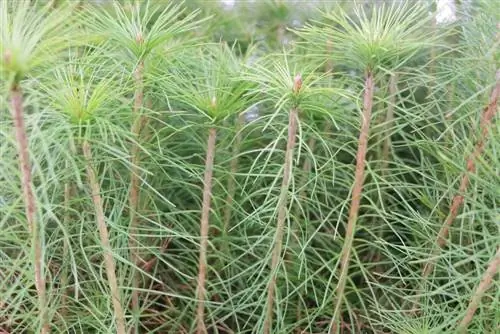- Author admin caroline@plants-knowledge.com.
- Public 2023-12-17 03:39.
- Last modified 2025-01-24 12:45.
Where should all the green waste go? Every garden owner knows this problem, because waste accumulates in the garden at any time of the year. Leaves, fallen fruit, fallen branches, wilted flowers, grass clippings and tree and shrub cuttings must be disposed of. What can go in the compost? What belongs in the organic waste? Which waste can still be of good use in the garden? We give the answers.
Composting
If you have enough space, you should definitely create a compost. Composting is the ideal way to
- cleaning up the garden and clearing it of plant waste
- to enable the recycling of organic raw materials
- create a supply of nutrient-rich humus
Tip:
By composting you are making a contribution to protecting the environment. With the humus you produce yourself, you can almost do without peat. Peatlands have to be drained to extract peat, which destroys valuable habitats. Composting is also very cost-effective because you have the fertilizer and soil conditioner directly in the garden and don't have to buy it.
Garden waste such as:should be added to the compost.
- Shrub cutting
- withered flowers
- Plant remains
- Lawn cutting
- wood cuttings
- Vegetable waste
- Fruit waste
- Leaves
- Acorns, chestnuts
- Nuts
- Pinecones
- shredded wood waste
- vegetable kitchen waste
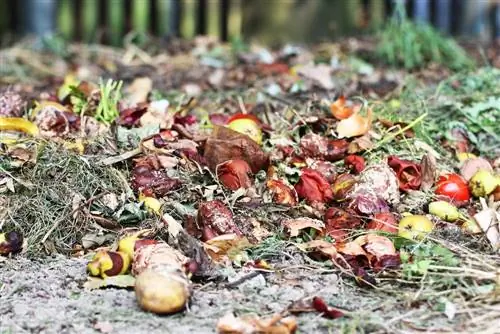
Note:
Shells from tropical fruits can be composted, but they rot much more slowly when treated with sprays and wax. It is important to ensure a good mix with other organic materials.
Not suitable for composting
Meat leftovers
They attract rats, stray animals and vermin.
Parts of diseased plants
Certain plant diseases can be transmitted to other plants via compost. Burn the plant parts or dispose of them in organic waste.
Ashes
The ash from wood and coal contains a high concentration of heavy metals after combustion. The heavy metals would get into the garden soil and the grown vegetables via the compost.
stable manure
Stable manure contains a high concentration of nutrients, which can lead to over-fertilization and damage to your plants.
Are weeds allowed in the compost?
Garden owners are always faced with the question of whether weeds belong in the compost or not. Weed seeds often only rot when it is very hot. Whether the required temperatures can be achieved in your compost depends, among other things, on the altitude. The desired heat is only generated in sufficiently high compost heaps. It is important to achieve optimal compost quality through frequent turning. Pre-composters that destroy the weed seeds are suitable.
Simply covering the compost can significantly reduce the spread of weeds. Weeds usually spread through seeds flying onto uncovered compost. They are then applied to the beds with excellent humus and find the best growing conditions.
Three alternatives for green waste
Green waste, i.e. branches, twigs, shrub cuttings, pine cones, chestnuts and acorns, has a lot of potential.
Mulch
Not only can you compost it, it makes an excellent mulch. To do this, chop up the green waste and distribute it generously on your beds. It improves the soil quality and keeps weeds away.
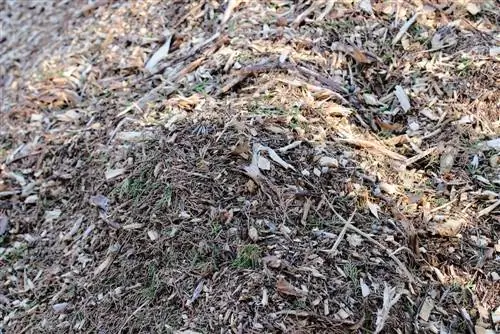
Raised bed
Green waste can be used excellently to create raised beds. Raised beds are made up of green waste, shredded material, leaves, compost and soil.
Decoration
How often have you purchased twigs or pine cones from a craft store to create arrangements, wreaths and floral decorations? From now on, pay attention to decorative twigs, cones and branch discs when it comes to green cuttings. The best craft materials can be found in your own garden!
Watch out for fallen fruit
Fallen fruit cannot be avoided. Try to quickly collect it from the ground. The longer it sits on the ground, the more pests are attracted.
Severely damaged fruits can be composted. However, fallen fruit should be mixed well with other plant residues. The fruit from sick trees is not allowed in the compost; it belongs in the organic waste bin. If large quantities need to be disposed of, you can bury the fallen fruit in the garden. Future potato beds in particular benefit from the additional nutrients. Make sure to bury the fallen fruit deep enough so that it is not found by wild animals.
Tip:
If you have more fallen fruit in your garden than you can process into juices and jams yourself, you can support the zoos in the region. Ask for! Many animals like to eat your fallen apples.
Acorns and chestnuts
If you have large oak or chestnut trees on your property, you can collect the fruit and offer it to the forester. They are fed to wild animals or even used to grow new plants. Are there children in your household? Then the collection will be even easier. Every year, various conservation organizations publish competitions for children to collect the valuable fruits and drop-off points in your area.
Tip:
You don't have to give away all the chestnuts and acorns, a handful should be left over for making the popular little men!
Organic bin
If you don't have space for composting, you can dispose of garden waste in the organic waste bin. However, only normal household quantities are intended for the organic waste bin. Twigs and branches should be put into the organic waste bin in chopped form.
Where should large quantities go?
In most cities and communities, collections of tree and shrub cuttings also take place in spring and autumn. You can dispose of garden waste at a recycling center near you. Ask your local authority. For larger amounts of waste, it is possible to order green waste containers from the regional waste disposal company. Regulations regarding the size and length of branches also apply to disposal in containers.
Burn garden waste?
Burning branches and twigs often seems like the easiest, quickest and most cost-effective solution. But is it also allowed? In some regions, exceptions apply at certain times and in compliance with strict regulations that allow garden waste to be burned on one's own property. It's best to ask your municipality's public order office. If a permit is available, in addition to fire safety, the protection of neighbors must be guaranteed. The burning of garden waste may only take place on weekdays between 8 a.m. and 6 p.m. when there is no wind.

In most regions there are sufficient disposal options and burning garden waste is prohibited. Anyone who lights a garden fire despite a ban must expect high pen alties. It is an administrative offense that is punishable with fines.
Disposal in the landscape?
It is not permitted to dispose of garden waste in the open countryside or in the forest. The waste from your garden has the ability to severely impact the natural ecosystem. Spreading waste in the landscape is an administrative offense that is punishable with four-digit fines.
Never put everything away
Even if you want a tidy, orderly garden, think about the animals! Create winter quarters for hedgehogs etc. out of branches, twigs and leaves. Deadwood corners are important habitats for insects and small creatures that can kill plant pests such as aphids and fungi.

